Introduction to Antiquarian Bible Collecting
Antiquarian Bible collecting is a distinguished pursuit that not only serves as a testament to the rich history of biblical texts but also reflects the scholarly appreciation for the preservation of religious artifacts. This specialized field has garnered considerable attention from collectors, historians, and bibliophiles alike, thanks to the intricate narratives woven into the pages of these ancient tomes. The significance of the Bible as a cornerstone of cultural and spiritual life throughout the ages further enhances its allure among collectors who seek to obtain rare and meaningful items for their personal collections.
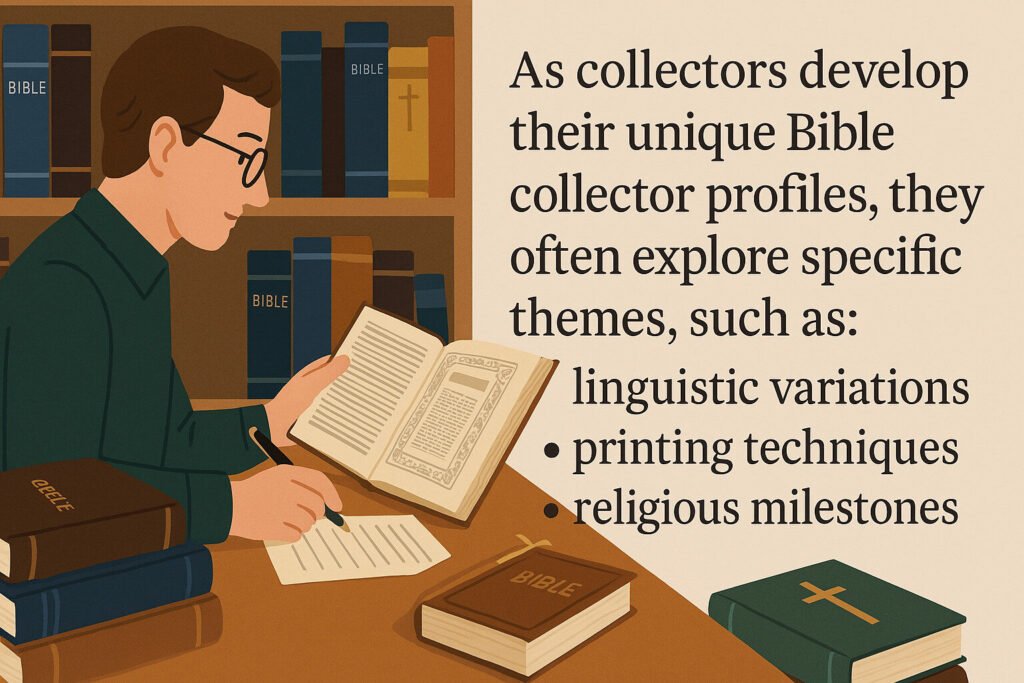
The passion for assembling notable collections of this nature has seen a marked increase in recent years. Many collectors are drawn to unique volumes and editions that shed light on various interpretations and translations of the biblical text. This not only broadens their understanding of scripture but also unveils the historical context in which these works were produced. Furthermore, famous Bible collections often serve as an educational resource, allowing future generations to better understand the evolution of biblical literature and its impact on society.
Specialized Bible collecting also presents an opportunity for enthusiasts to engage with fellow collectors, historians, and theologians. The community surrounding antiquarian Bible collecting is rich in shared knowledge and mutual interests, fostering a supportive environment for those eager to delve deeper into this captivating field. As collectors develop their unique bible collector profiles, they often explore specific themes, such as linguistic variations, printing techniques, or even religious milestones, which contribute to the diversity of their collections. Overall, the act of collecting antiquarian Bibles is not merely about owning physical texts; it embodies a profound respect for the enduring legacy of the written word and its power to inspire and inform. This overview offers a glimpse into the enduring appeal of antiquarian Bible collecting, setting the foundation for exploring the profiles of notable collectors and their extraordinary contributions to the field.
Understanding Specialized Bible Collections
Specialized Bible collections refer to the focused gathering of particular types, themes, or editions of Bibles that reflect the unique interests and expertise of a collector. This approach not only allows collectors to delve deeper into specific aspects of biblical texts but also enhances the richness of their collections. There are numerous categories within specialized Bible collecting, each offering distinct treasures to enthusiasts. Collectors may choose to focus on early printed Bibles, which hold historical significance as some of the first texts produced using the printing press. These early editions are often sought for their craftsmanship and the pivotal role they played in spreading biblical scriptures during the Reformation.
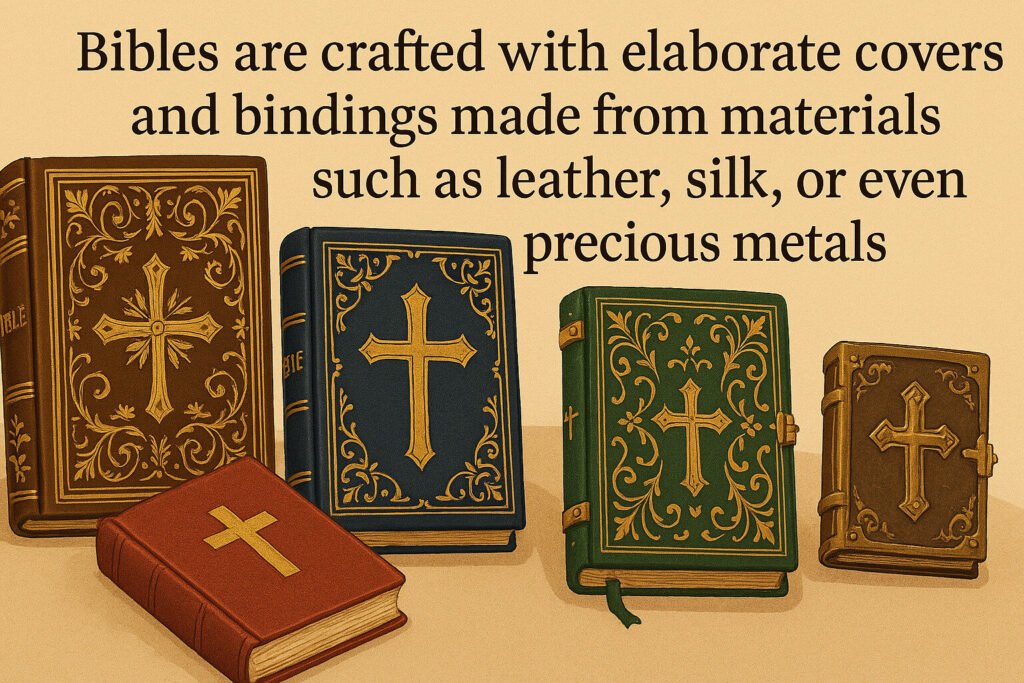
Another popular niche in specialized Bible collections includes unique bindings. Bibles crafted with elaborate covers and bindings made from materials such as leather, silk, or even precious metals can be found. These details not only enhance the aesthetic appeal but also provide clues regarding the era in which they were created and the cultural significance associated with that period. Furthermore, limited edition Bibles attract collectors who appreciate exclusivity and the artistry involved in their production, often leading to heightened demand and increased value over time.
Specialization in Bible collecting can have profound implications. On a personal level, focusing on a specific type of Bible allows collectors to cultivate a deeper connection with their acquisitions. It fosters a sense of expertise and pride as they navigate intricacies, history, and the interplay of different biblical texts. Furthermore, specialized Bible collector profiles contribute to the broader collector community, promoting an appreciation for the diverse manifestations of scripture. Such profiles often inspire collaboration, discussion, and the sharing of resources among collectors, ultimately enriching the field of antiquarian Bible collecting and preserving its significance for future generations.
Notable Bible Collectors: Case Studies
Throughout history, there have been numerous collectors whose dedication to antiquarian Bible collecting has not only enriched their personal libraries but has also significantly impacted the broader field. Below are some notable Bible collectors.
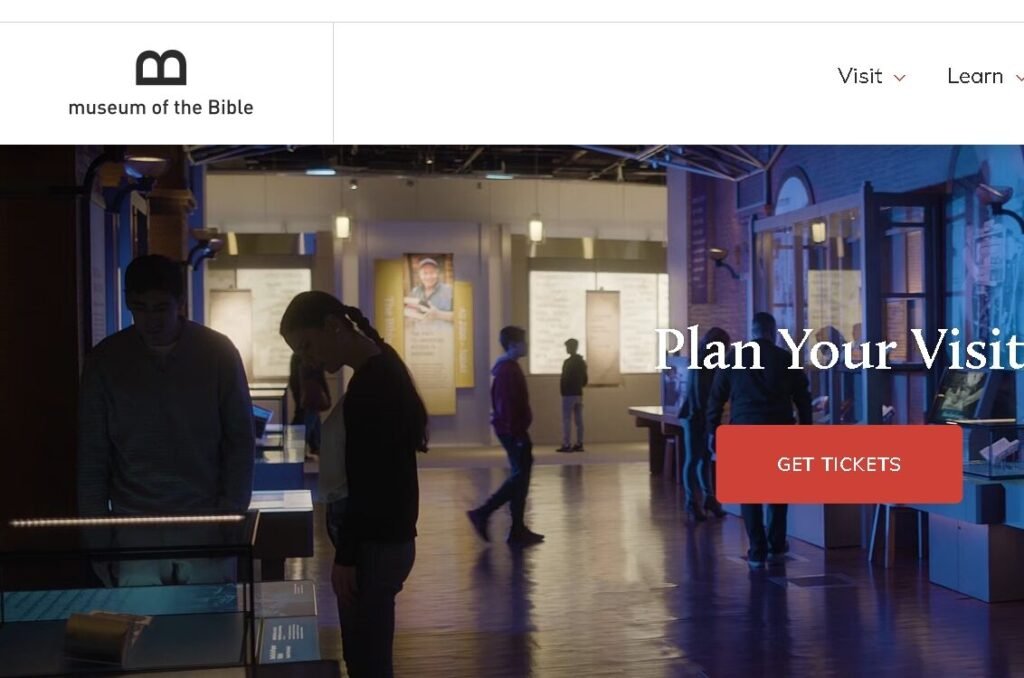
The Green Family (Hobby Lobby): The Green Collection, also known as the Museum of the Bible Collection, is one of the world’s largest private collections of rare biblical texts and artifacts. It encompasses over 40,000 biblical antiquities, assembled by the Green family, founders of Hobby Lobby.
Reference: Museum of the Bible
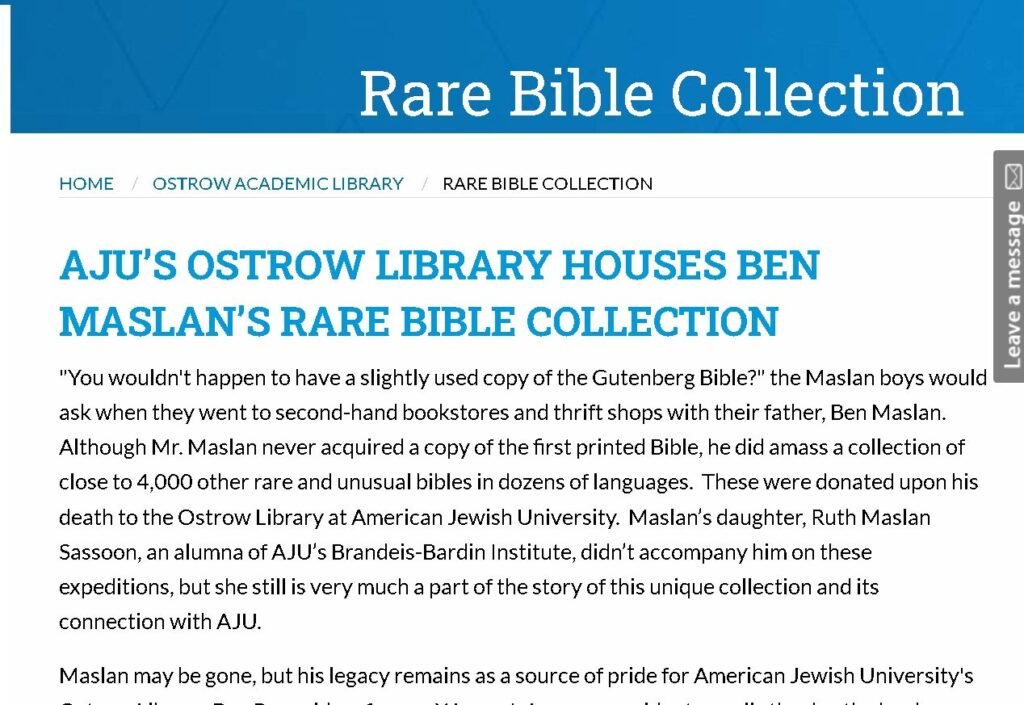
Ben Maslan: Mr. Maslan, though he never acquired a Gutenberg Bible, amassed a collection of nearly 4,000 rare and unusual Bibles in dozens of languages. His extensive collection was donated to the Ostrow Library at American Jewish University, reflecting a passion for the printed word.
Reference: Maslan Rare Bible Collection
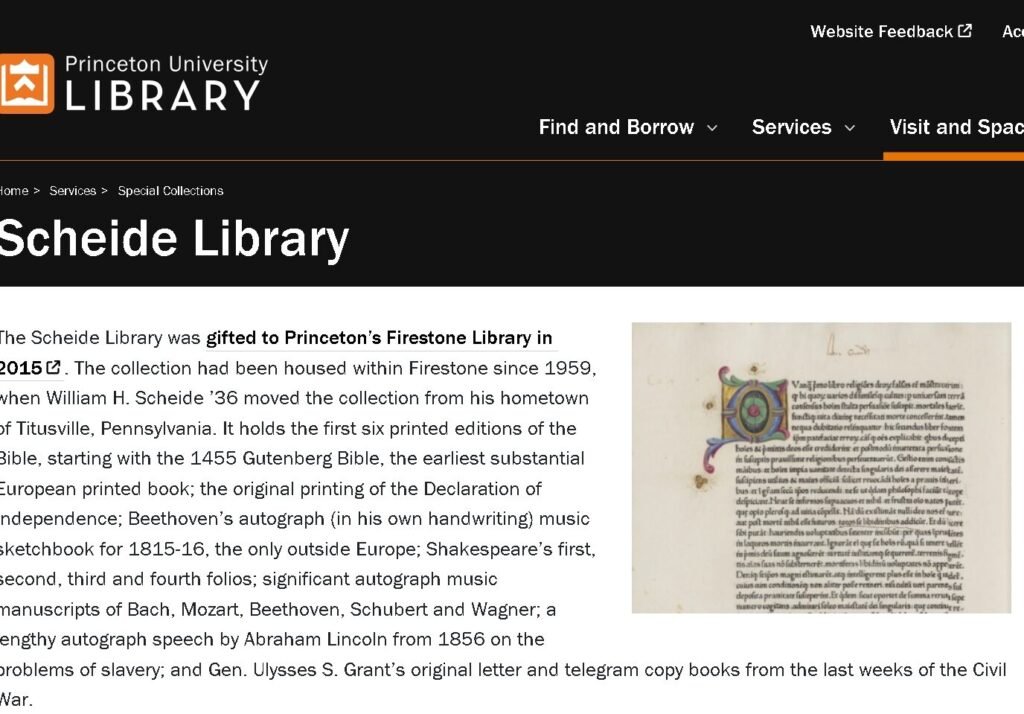
William H. Scheide: Princeton University’s Firestone Library is home to the Scheide Library, a collection gifted in 2015 by William H. Scheide. This notable collection features the first six printed editions of the Bible, including the 1455 Gutenberg Bible, along with other significant historical documents.
Reference: The Scheide Library
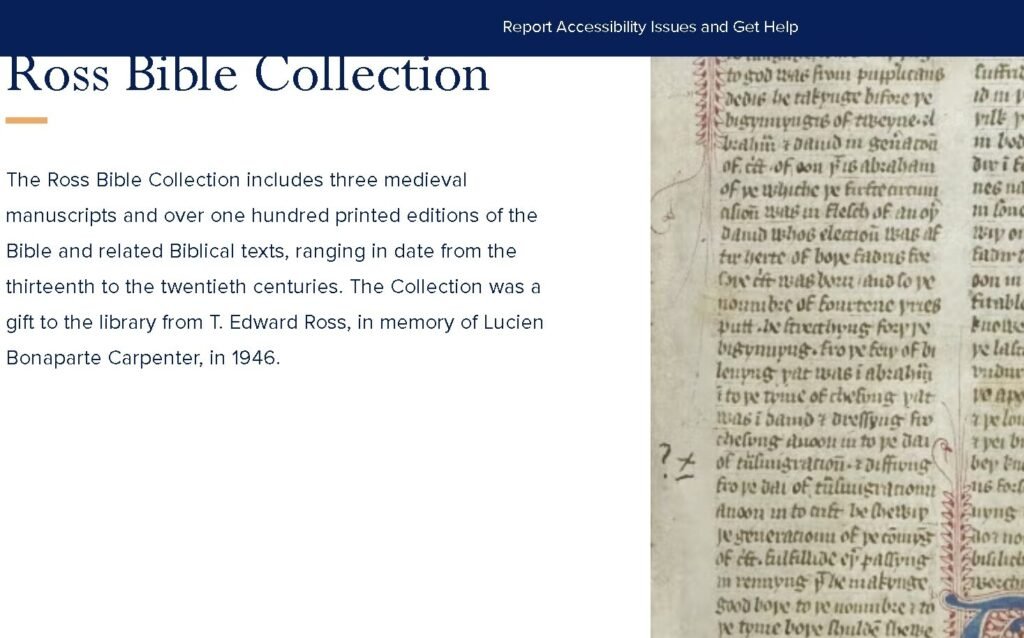
T. Edward Ross: T. Edward Ross, an accountant and founding member of a prominent accounting firm, formed the Ross Bible Collection at Penn Libraries. This collection includes valuable medieval manuscripts, early printed books, and later editions of the Bible, providing insights into its transmission and study.
Reference: Ross Bible Collection
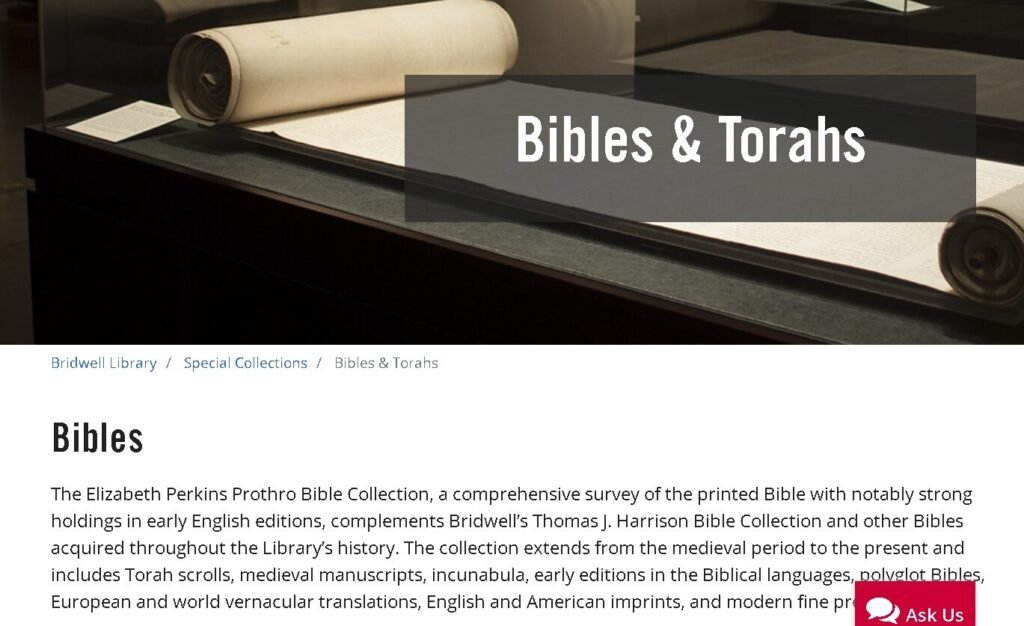
Elizabeth Perkins Prothro: The Elizabeth Perkins Prothro Bible Collection at Southern Methodist University’s Bridwell Library offers a comprehensive survey of the printed Bible, with a focus on early English editions. It complements other Bible collections at the library and extends from the medieval period to the present, including Torah scrolls, manuscripts, incunabula, and various vernacular translations.
Reference: The Elizabeth Perkins Prothro Bible Collection
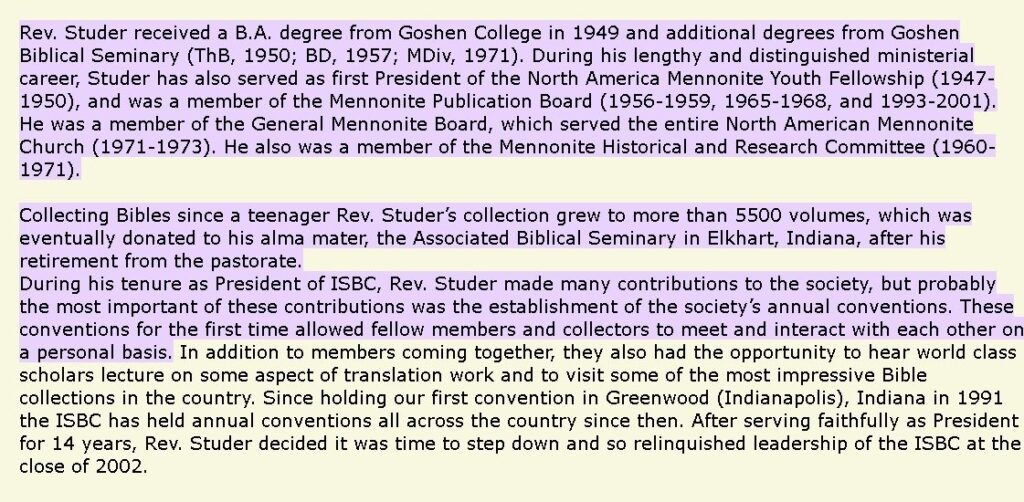
Rev. Studer: Rev. Studer, a long-time minister, collected Bibles since his youth, ultimately accumulating over 5,500 volumes. His collection was donated to the Associated Biblical Seminary in Elkhart, Indiana, where he served as President of the International Society of Bible Collectors, fostering interaction among fellow collectors.
Reference: Rev. Studer’s collection
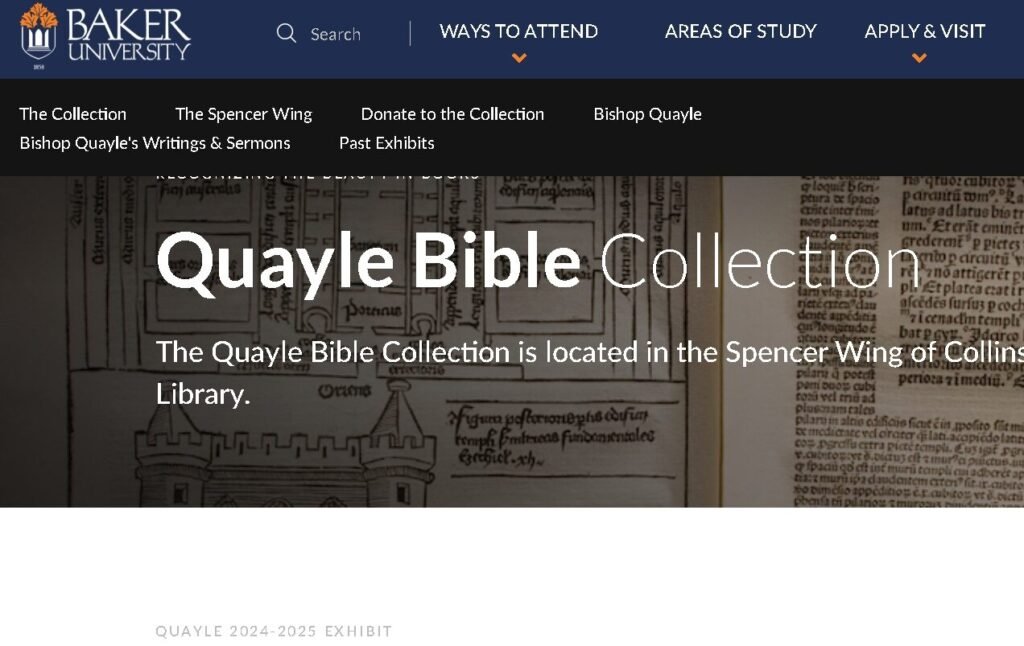
Bishop William Alfred Quayle: Quayle’s collection, housed at Baker University, reflects a passion for the history of printing and Bible translation. It features a wide range of Bibles and other religious and historical documents, including illuminated manuscripts and examples of early printers and milestones in Bible translation.
Reference: The Quayle Bible Collection
The field of antiquarian Bible collecting is marked by diverse collectors who bring distinct philosophies and focuses to their pursuits. Whether through acquiring notable biblical texts that highlight cultural transformations or collecting rare editions that spark scholarly dialogue, these collectors contribute immensely to preserving the historical heritage encompassed within the pages of the Bible. Each profile showcases the inherit passion and fervor that defines the world of antiquarian Bible collecting.
Institutional Approaches to Bible Collection
Institutional collectors, including libraries, universities, and museums, play a pivotal role in the realm of antiquarian bible collecting. Their approaches are characterized by strategic planning and a commitment to preserving historical biblical texts for future generations. These institutions accumulate their collections through various means, including acquisition from private collectors, auctions, and sometimes through donations, which enables them to build a diverse array of resources that reflect the evolution of biblical scholarship and the socio-cultural contexts of their times.
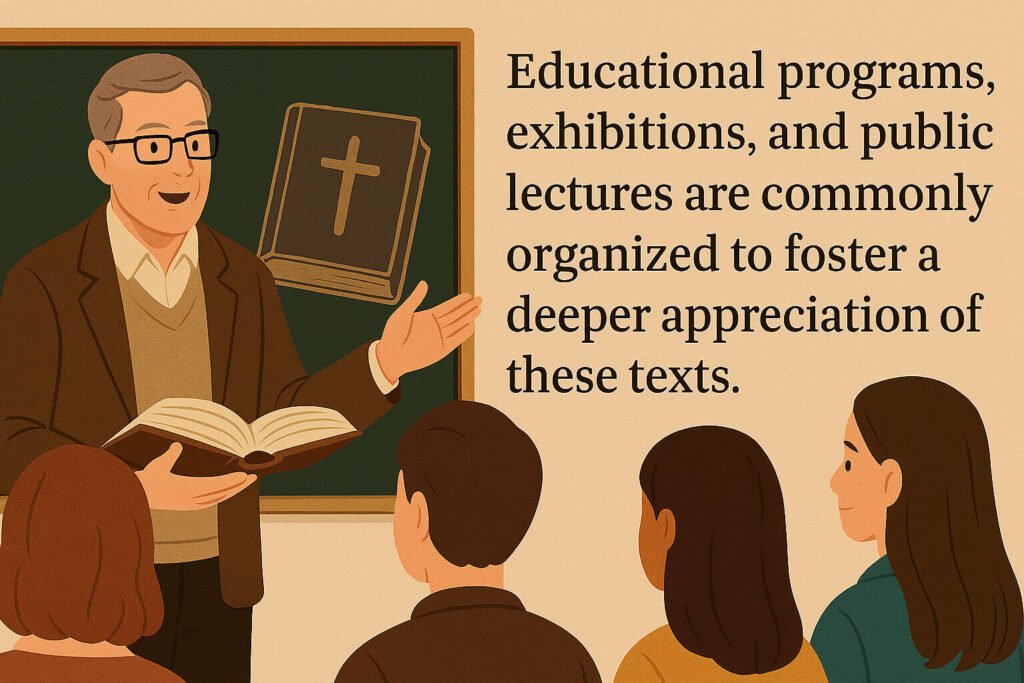
One key aspect of institutional bible collecting is the focus on creating comprehensive collections that cater to a wide range of academic and public interests. Libraries may seek to acquire items that span from early printed bibles to modern translations, ensuring that they offer a robust selection of texts that detail different biblical interpretations and historical contexts. University collections often emphasize the scholarly utility of their holdings, focusing on specialized bible collecting that supports research and education in theology, history, and literature.
Furthermore, museums often curate their bible collections with an emphasis on display and public engagement. These institutions not only collect bibles but also strive to present them in ways that highlight their historical significance and aesthetic appeal. Educational programs, exhibitions, and public lectures are commonly organized to foster a deeper appreciation of these texts. Such initiatives help demystify the historical bible collector profiles and raise awareness regarding the cultural importance of these artifacts.
Overall, institutional approaches to bible collecting reflect a balance between scholarly objectives and public engagement. These avenues serve not just to preserve rare artefacts but also to educate and inspire a wider audience. Promoting access to famous bible collections enhances public understanding and appreciation for the importance of these historical texts, showcasing their significance across various facets of society.
Collecting Strategies: What to Consider
Engaging in the world of antiquarian bible collecting requires not only passion but also a structured approach to ensure that collectors maximize their experience and investments. To develop personalized collecting strategies, several factors should be meticulously considered. First and foremost is budget considerations. Establishing a clear budget is crucial as it informs purchasing decisions and helps to narrow down potential acquisitions. Antiquarian bibles can range dramatically in price, depending on their rarity, condition, and historical significance. Collectors should assess their financial limits and plan for both acquisition costs and additional expenses like restoration or preservation.
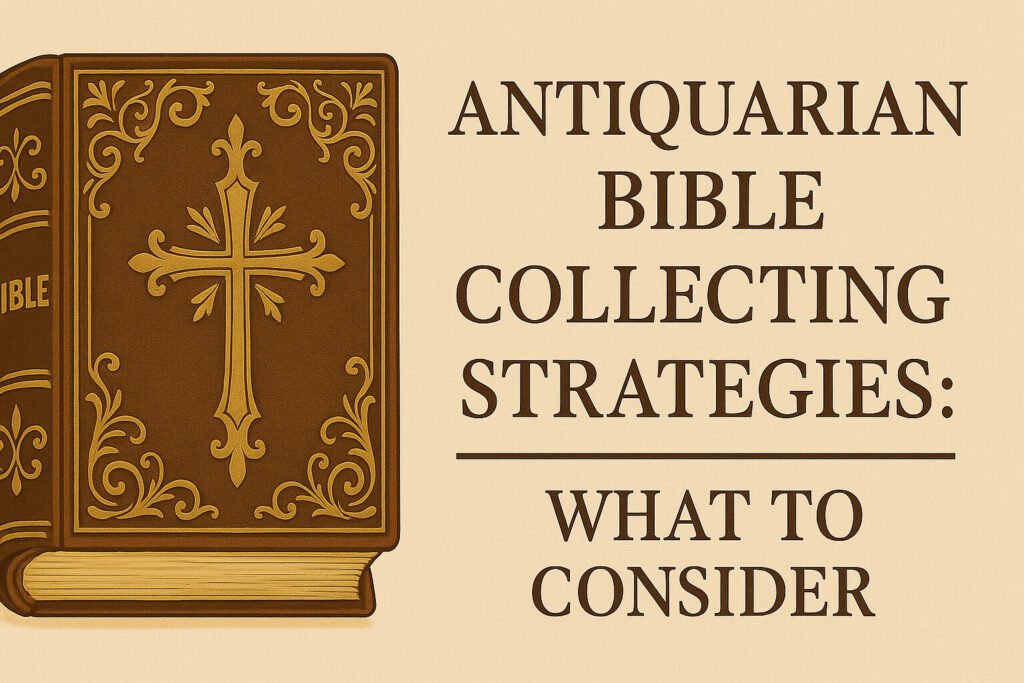
Condition assessment is another essential consideration. It is imperative to evaluate the physical state of a bible before making a purchase. Collectors should familiarize themselves with standard grading systems and restoration techniques to make informed decisions about their acquisitions. A thorough inspection can help avoid costly regrets down the line. Lastly, networking with other collectors and experts in the field can prove invaluable. Sharing knowledge with seasoned collectors and historians can provide guidance on the nuances of specialized bible collecting, including market trends and emerging opportunities.
By thoughtfully considering these strategies, individuals can navigate the complexities of bible collecting with confidence and precision, building collections that reflect their interests and ambitions.
The Role of Technology in Bible Collecting
In recent years, technology has transformed various aspects of antiquarian bible collecting, providing innovative tools and platforms that have significantly impacted how collectors pursue their interests. One of the most significant developments has been the advent of digital catalogs, which allow collectors to access a wide range of bible collector profiles and rare editions from the comfort of their homes. These catalogs often include detailed descriptions, pricing information, and photographs, enabling potential buyers to make informed decisions without the need for physical inspection.

Furthermore, online auctions have emerged as a prominent venue for specialized bible collecting. Unlike traditional auction houses, which typically operate within a limited timeframe and location, online platforms offer a persistent opportunity to search for and acquire unique bibles, generating increased competition and, at times, driving up prices.
Additionally, social media platforms have proven to be invaluable tools for the antiquarian bible community. Collectors can now share their discoveries, engage in discussions, and celebrate their collections with a global audience. Forums and groups dedicated specifically to bible collectors facilitate the exchange of knowledge and experiences, helping enthusiasts connect with like-minded individuals and experts in the field. This communal approach fosters an environment where specialized bible collecting becomes not just a solitary pursuit but a shared journey, enabling collectors to learn from one another and gain insights into collecting trends and techniques.
Overall, technology plays a pivotal role in the evolution of antiquarian bible collecting, enabling collectors to navigate a broader marketplace effectively and enriching their experiences through enhanced communication and information sharing.
Community and Networking Among Collectors
In the realm of antiquarian bible collecting, community and networking play pivotal roles in enhancing the experience and knowledge of collectors. Individuals interested in building bible collector profiles often find themselves engaging with a vast network of fellow enthusiasts who share similar passions and interests. This dynamic community promotes the exchange of information, guiding collectors toward rare finds and specialized bible collecting techniques.
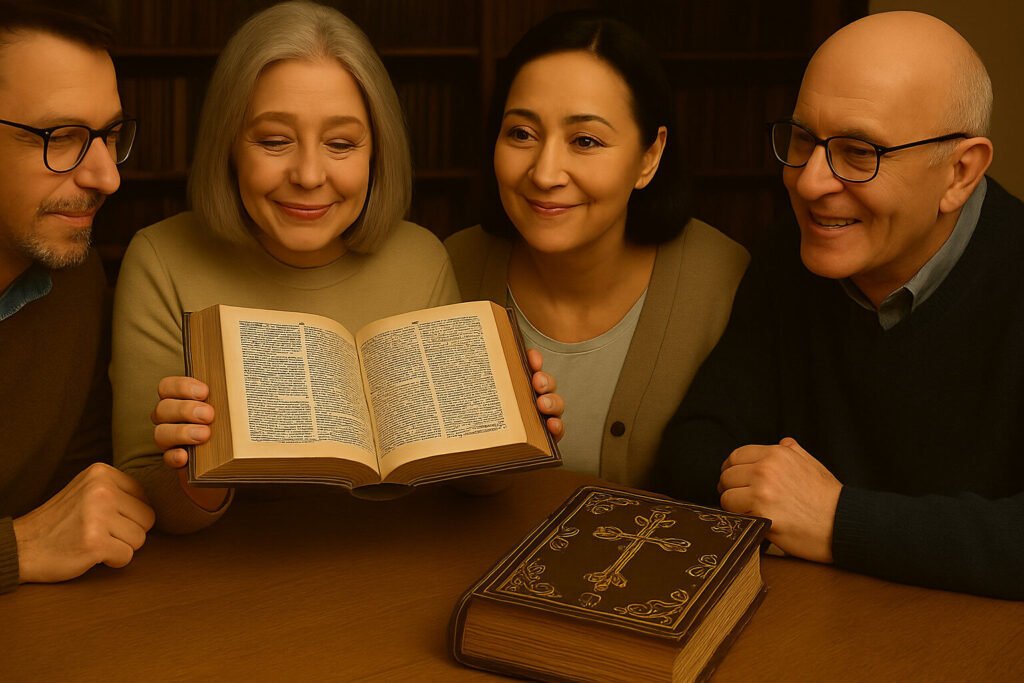
Collecting bibles not only serves as a personal journey but also opens avenues for collaboration. Various clubs and organizations are dedicated to antiquarian bibles, providing platforms for members to share insights about famous bible collections and the significance of particular texts. Such clubs often organize meetings, where collectors can discuss their latest acquisitions, share stories, and even arrange swaps, enhancing their personal collections with new additions.
Furthermore, the growth of online forums has revolutionized how collectors network. Digital spaces allow individuals from all walks of life and geographical locations to come together and discuss everything from preservation methods to valuation of their antiquarian bibles. Here, members can post questions, seek advice, and engage in lively discussions that deepen everyone’s understanding of the field. Knowledge sharing becomes a cornerstone of these interactions, with experienced collectors mentoring newcomers and helping them navigate the complexities of the world of bible collecting.
Attending specialized conferences further strengthens bonds within the community. These gatherings not only feature exhibitions showcasing remarkable bible collections but also present opportunities for networking. Collectors can meet authors, scholars, and other experts, which further enriches their collecting journey. By fostering relationships within the antiquarian bible collecting community, collectors enhance their knowledge while cultivating a supportive network that recognizes the value of sharing resources and experiences.
Future Trends in Antiquarian Bible Collecting
The influence of millennials and Gen Z on this segment cannot be overstated. With their distinct approach to collecting, these younger generations are redefining the standards of what it means to be a bible collector. They tend to gravitate towards digital platforms and online marketplaces to share, trade, and showcase their acquisitions. This digitization opens up new avenues for specialized bible collecting and promotes networking among collectors worldwide. As these generations instill their values into the antiquarian bible community, there exists a strong potential for innovative collecting practices to flourish.
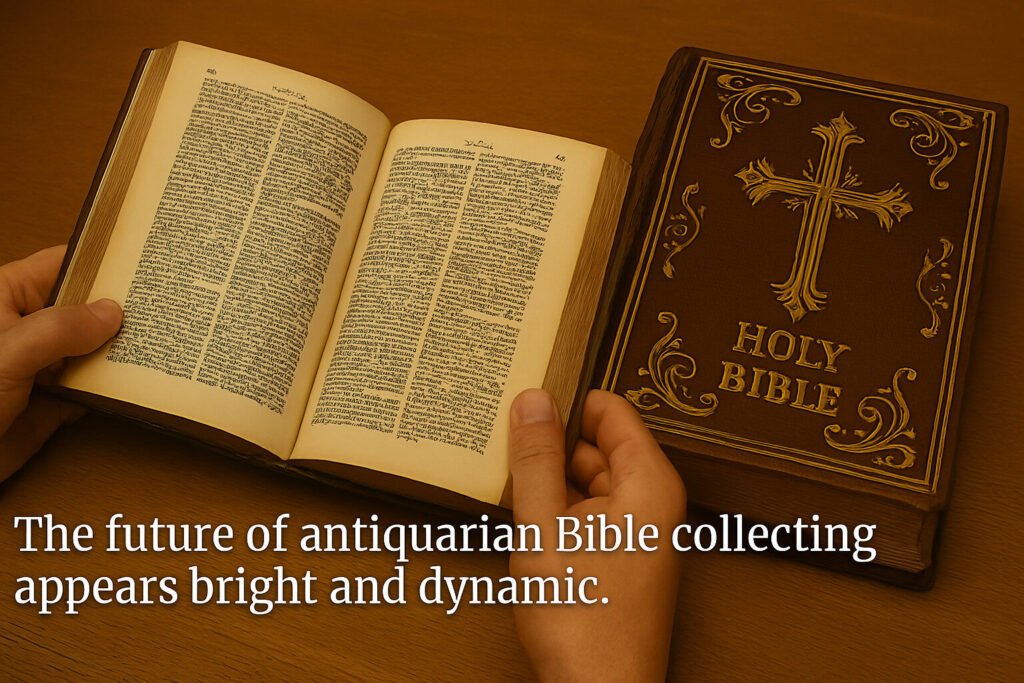
The future of antiquarian bible collecting appears bright and dynamic, influenced by trends such the fresh perspectives of younger collectors. As the community continues to evolve, the possibilities for notable bible collector profiles and famous bible collections will expand, encouraging a richer, more multifaceted appreciation for this unique form of collecting.
The Enduring Value of Antiquarian Bible Collecting
The world of antiquarian bible collecting plays a significant role in preserving not only religious texts but also the cultural and historical context from which these bibles emerged. Throughout this blog post, we have explored various prominent bible collector profiles, shedding light on their dedication and passion for amassing remarkable collections. These collectors have showcased the profound connection between specific bibles and the overarching narrative of human civilization, emphasizing the importance of specialized bible collecting.
Notable collectors often curate famous bible collections that serve as more than just museum displays; these collections are living embodiments of faith, art, and history. From the craftsmanship of early editions to the artistry of illustrated bibles, each item has a story that enhances our understanding of religious devotion through the centuries. By focusing on the nuances of different versions, languages, and printings, collectors not only safeguard these texts but also inspire others to appreciate the depth and richness found in these sacred works.
The enduring appeal of antiquarian bibles lies in their ability to connect individuals with a broader cultural heritage. They offer tangible links to the past, enabling present-day readers and researchers to examine the evolution of beliefs, practices, and interpretations that have shaped society. Furthermore, the commitment of collectors ensures that future generations will have access to these precious artifacts, fostering a sense of continuity and appreciation for the written word.
As we look towards the future, the relevance of antiquarian bible collecting continues to flourish. In an ever-changing world, the mission of enthusiasts to preserve these significant texts remains crucial, as each bible collected serves as a reminder of both collective history and individual faith. The legacy crafted by passionate collectors exemplifies the value of stewardship over our cultural and spiritual narratives.
Bible Collector’s Handbook
★★★★★
You can own a beautiful piece of Bible history. A rare Geneva Bible printed by Robert Barker in London.
Own a part of Bible History!
$2,999.99
